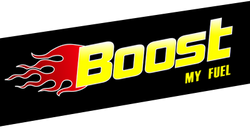(1.) Fuel Injector Tips, and Atomizing Orifices, are cleaner and properly lubricated.
(2.) Fuel Pumps are more lubricated, and the polymerization retardant keeps diesel fuel pump-able.
(3.) Fuel Filters stay cleaner for longer periods of time.
(4.) Valves and Valve Guides, show less torching and carbon build-up.
(5.) The Combustion Chamber, is free of carbon deposits, or significantly reduced.
(6.) Top End Lubricant, provides additional lubrication to upper piston cylinder walls, and piston rings.
(7.) EGR Valves are cleaner, due to more complete fuel combustion.
(8.) Rust and Corrosion Inhibitors, prevent Fuel Tank and Fuel System corrosion caused by oxidation and condensation.
(9.) Smoke Stack/Exhaust - The combustion catalyst in BOOST provides you with greater fuel efficiency. In comparative tests, the additive decreased combustible carbon residue 60 to 90 percent. These results are evidence of more complete combustion.
Also, the resulting lower carbon residue indicates more BTUs (power) per pound of fuel were burned. Therefore the effect of Combustion Catalyst burn-rate modifier is twofold. More complete combustion produces more useful energy while reducing soot and smoke.
(10.) Turbo Chargers - Due to a more complete combustion of the fuel, there are reductions in un-burned carbon. The polymerization inhibitor in BOOST , prevents the hydrocarbon molecules from restructuring into bigger chains, and there is less residue available for unintentional return to the turbo charger.


